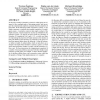Free Online Productivity Tools
i2Speak
i2Symbol
i2OCR
iTex2Img
iWeb2Print
iWeb2Shot
i2Type
iPdf2Split
iPdf2Merge
i2Bopomofo
i2Arabic
i2Style
i2Image
i2PDF
iLatex2Rtf
Sci2ools
107
click to vote
ATAL
2007
Springer
2007
Springer
Normative system games
We develop a model of normative systems in which agents are assumed to have multiple goals of increasing priority, and investigate the computational complexity and game theoretic properties of this model. In the underlying model of normative systems, we use Kripke structures to represent the possible transitions of a multiagent system. A normative system is then simply a subset of the Kripke structure, which contains the arcs that are forbidden by the normative system. We specify an agent’s goals as a hierarchy of formulae of Computation Tree Logic (CTL), a widely used logic for representing the properties of Kripke structures: the intuition is that goals further up the hierarchy are preferred by the agent over those that appear further down the hierarchy. Using this scheme, we define a model of ordinal utility, which in turn allows us to interpret our Kripke-based normative systems as games, in which agents must determine whether to comply with the normative system or not. We then...
Related Content
| Added | 07 Jun 2010 |
| Updated | 07 Jun 2010 |
| Type | Conference |
| Year | 2007 |
| Where | ATAL |
| Authors | Thomas Ågotnes, Wiebe van der Hoek, Michael Wooldridge |
Comments (0)

